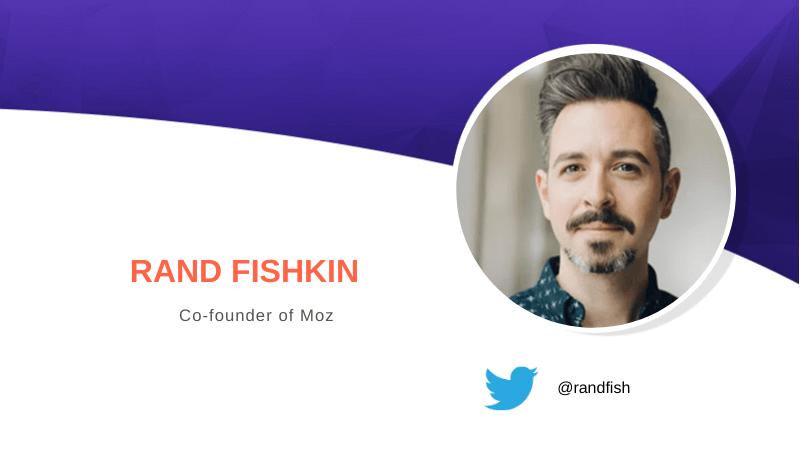Q&A with Rand Fishkin: A Founder’s Look at the Reality of Startup Failures and Successes
Reputation Staff Writer


Rand Fishkin is best known for co-founding Moz, but he’s also the founder of SparkToro, a company that makes software to assist with marketing efforts, and the author of Lost & Founder: A Painfully Honest Field Guide to the Startup World, which gives entrepreneurs unvarnished advice about succeeding with their startup. Find out what to do — and what not to do — to get noticed and be successful in today’s business world.
Your book, Lost & Founder: A Painfully Honest Field Guide to the Startup World, is not a romantic rags-to-riches tale. What prompted you to write it? Besides helping others avoid the mistakes you made, what do you hope to achieve with this book?
The biggest impetus for the book was the experience of talking to other founders and early-stage employees, and finding that the same conversations come up over and over.
I loved the experiences of helping others with their struggles in the startup world but realized early on that it wouldn’t scale. What’s worse, the vast majority of the startup world isn’t willing or able to be transparent enough — especially about failures — to share the crucial lessons and big picture of what’s really going on.
My hope is that folks read the book before they start their business or in the early stages, and hopefully avoid many of the pitfalls that we encountered. So far, that’s proven true for many thousands of folks, and that brings me a lot of joy.
Do you read reviews and feedback and feel that you’ve done an important service that no one else had the courage or the desire to do?
I have read some of the reviews of the book, and it seems that folks are generally getting the value from I hoped they would. I don’t know that no one else had the courage — perhaps it’s more that few folks had the right combination of experiences and the bandwidth to write a book about it.
Do you think people learn what they need to know to launch a business in school, or is it mostly on-the-job training?
I think business schools can provide some helpful lessons and fundamentals, but most startup founders and entrepreneurs I know never went to business school. It’s not that B-school is bad or the wrong choice, but it’s not even available to everyone, and it can’t give folks the types of experiences that starting a business can.
You mention content creation has exploded, that it’s harder to stand out. Anyone can see the internet is flooded with poorly conceived, undeveloped ramblings. Can Google not differentiate? Will quality content drown in the deepening pools of drivel?
No, quality is still one way to stand out, but quality alone can’t save you.
A lot of low-quality content thrives and flourishes while much that is wonderful languishes in obscurity. Distribution, medium, connections, community, amplification and access are all huge components of what achieves visibility, too. It’s crucial in my view not to become obsessed with one of these features and forget the importance of the others.
How do you know how widely to cast the net when trying to snare new prospects? You’ve advised new companies with smaller budgets to target narrower audiences, trying to cement a core group of clients instead of spending time and money trying to attract new ones. What about those companies in the middle? How do they know how much to allocate to each pursuit?
There’s no set formula for this kind of thing. My sense is that most businesses, especially in early stages, overly focus on trying to attract a big audience rather than a loyal, smaller one. The latter is far more powerful than people give it credit for, and often a better way to build a business that works long-term.
What advice would you give to “solopreneurs” who wear all the hats in their business? Not only is their budget limited, but their time is too. You say it’s critical to understand your customers and what they want, but sleuthing that out can be time-consuming. What is most important? Percentage-wise, how much time should they spend planning and marketing vs. providing their product or service?
If you’re a solopreneur, you need to focus on where the problems exist. If you’re doing fine on the marketing front, don’t invest too much more bandwidth. But if getting in front of an audience that might become customers is your biggest challenge, then you’d better invest there!
If you’re just starting out, it’s my opinion that it’s really hard to over-invest in learning more about your audience and your potential customers.
You have talked about consistency with brand promise being a good way to promote and protect a company’s reputation. What about companies that are looking to expand and offer new and different products and services? How can you innovate and take risks while still protecting your good name and your brand?
I think expansion into new product lines is a risky practice that shouldn’t be undertaken lightly.
The best advice I can give is to make sure your brand’s fundamental promises — what you’re known and loved for — is well understood (often it isn’t, even by those who’ve created the product!) and repeated in the new products.
If you’re known for great service and you put out a product with shoddy support, that’s going to harm your reputation far more than if you’re known for no support.
I’d also make sure that there’s a strong connecting line between the new product and the existing ones. Does it help the same people? With a similar problem? In a similar way? Through a familiar conduit and product design? I think you need to say “yes” to at least two or three of those questions to take the leap.
Want to turn your customers into brand advocates? Download our Turn Your Customers into Brand Champions Guide today.


